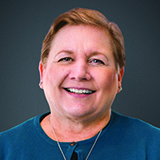Dear Navigators, Social Workers, Administrators, and Clinical Staff,
We are entering the third year of dealing with the COVID-19 pandemic. While the Omicron variant seems to be diminishing, we cannot deny the impact the virus has had on our oncology clinics.
Cancer statistics for 2020 and 2021 will appear unusually low because people across the country canceled or delayed cancer screenings. As people feel safe to return to medical facilities and resume cancer screenings, we will see an increase in diagnoses. As a result, 2022 will likely see a much higher number of cancer diagnoses when compared to the previous 2 years. Likely, this will include more cases of late-stage cancers. This situation will continue to tax our operating rooms, chemotherapy infusion centers, and radiation facilities.
While the impact of COVID has had a largely negative impact for our oncology patients, there is a positive I’ve witnessed over the past 2 years. Many medical oncologists were compelled by the current environment to have thoughtful and candid conversations with patients with advanced cancers about enrolling in hospice care at home rather than continuing to receive treatments that were more toxic and were known to have little if any benefit. These conversations were necessary as doctors knew that when the patients became ill from the treatments and needed hospitalization, there would likely be no beds available.
I hope that oncology professionals have learned the benefit of initiating the hospice conversation at the right time, rather than discussing discontinuation of treatments only when the patient is too ill to receive another infusion therapy. It seems many times we only offer hospice care for a week or two, when in truth, hospice care is designed for up to 6 months of care. Patients who are enrolled earlier live longer, maintain a better quality of life, and have time to get closure with their family and with themselves.
With aging baby boomers and pandemic-related delayed cancer diagnoses, we can expect the number of people diagnosed with cancer to grow. It’s easy to predict the need for effective navigation to grow as well. I am hopeful that the number of oncology nurse navigators and members of AONN+ will continue to grow to keep up with the needs of patients.
As always, thank you for your dedication to our profession and your membership and participation in AONN+.
Sincerely,

Lillie D. Shockney, RN, BS, MAS, HON-ONN-CG
Editor-in-Chief, JONS
University Distinguished Service Professor of Breast Cancer; Professor of Surgery, Johns Hopkins University School of Medicine; Co-Developer of Work Stride: Managing Cancer at Work, Johns Hopkins Healthcare Solutions; Co-Founder of AONN+; Co-Founder of the Association of Chronic & Complex Care Nurse Navigators (ACCCNN).
This email address is being protected from spambots. You need JavaScript enabled to view it.




